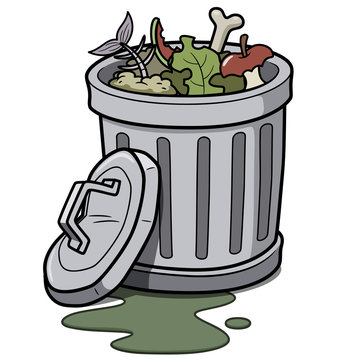
If you type “trash bin” in your search engine, you’ll find a number of trash bins in various sizes and shapes. In my household, I have at least one bin to every room, from bathroom and kitchen to study and bedrooms. Last month the repair of my damaged condo by water pipe burst finally came to fruition. As I was moving out of the condo temporarily to give way to the remodeling crew, I realized the thirteen-gallon kitchen trash bin had to stay in the vacant house. Even if I wouldn’t produce trash during my absence, the remodeling crew would. We, literally, cannot live without a trash bin.
If you visit any Home Depot store or ask the associates at the lumber section, you’ll notice that the Husky contractor trash bags are one of the popular items in the store. The shelves that carry these items go empty as soon as the shelves of plastic water bottles, which are also quickly sold out, in the store. As we make our homes beautiful, we overlook our trash as being more or less not-in-my-backyard (NIMB). Homeowners should know construction trash should be disposed at different designated sites away from municipal waste dumpsters. However, knowing is one thing, doing is another. And law enforcement on homeowners’ and contractors’ not doing the right thing in this country is nearly nonexistent.
Why would I say that? I saw contractor’s trash bags in the dumpsters in my community before. I also saw contractors who dumped their black trash bags into the trash bins of the Home Depot. How often do you pay much attention to the trash you dump? I learned from a store associate at the Home Depot during my checkout that there were thieves who hid the tools in trash bags and collected them from the trash bins when they left the store.
What about all those unwanted cardboard boxes and medicine bottles that have the consumers’ names and addresses in the labels? Do you scratch out your personal information before you toss your boxes and bottles?
When I was in grad school learning about global sustainability, I was aware of how wasteful the packaging industry was. I remember before COVID-19 I saw in residential communities in China piles of empty boxes discarded near the dumpsters. That nightmare happened later on in my community in Northern Virginia. I believe the same nightmare happens everywhere now because while e-commerce is booming, our single-use packaging materials are also on the rise exponentially. Not to mention the retail giants contributing to excessive shipping emissions. I hope the relentless version of “Made in USA” under the Biden Administration will shed light on the accountability of all players in the free market in terms of their handling of waste.
We cannot live without trash bins. It’s a myth that other nonhuman species also produce waste but their waste tends to have little negative impact on our shared environment. But human’s waste, if not carefully categorized, does do damage to our environment. The recent oil spill in the Philippines seas has caused local villagers feeling nausea and dizziness. Marine biologists say some 89 acres of coral reef, mangroves and sea-grass are at risk from the oil spill. Even if we have a gigantic trash bin to collect the entire oil spill, where should we dispose the waste? In early March, the United Nations members have agreed on a unified treaty to protect biodiversity in the high seas. This year marks the 50th anniversary of US’s Endangered Species Act. Well, if humans do respect biodiversity, humans should do the fair share to create a better environment for both humans and nonhumans, no?
This is a ten billion dollars question. How to reuse our waste? Please do not send it away to other countries though. A report shows Canadian companies illegally shipped at least 2,300 metric tons of waste overseas last year. Aside from being mindful of what I am throwing away into my trash bin, I learn that my county recently began accepting food scraps for composting. That’s a small progress. If only more households are knowledgeable about composting and regular pick-up services are available, I believe our soils will be healthier and landfill methane will be cut significantly too. Who knows, perhaps if you dig deeper in your own trash bin, you’ll turn trash into treasure.
“On the one hand, one of my own most important environmental ethics is that people should always be conscious that they are part of the natural world, inextricably tied to the ecological systems that sustain their lives. [. . . ] On the other hand, I also think it no less crucial for us to recognize and honor nonhuman nature as a world we did not create, a world with its own independent, nonhuman reasons for being as it is.”
—William Cronon, author of “The Trouble With Wilderness”
